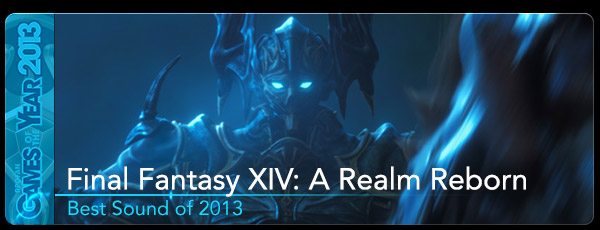
When it comes to composing music for a Final Fantasy title, Nobuo Uematsu's shoes are some of the hardest to fill. There's a reason why his name is heavily associated with the series' legacy, and perhaps the only redeeming quality of Final Fantasy XIV 1.0 was Uematsu's musical work. When it was announced that relatively unknown Square Enix composer Masayoshi Soken would be taking the helm for A Realm Reborn's all-new soundtrack, some cried blasphemy at the idea of "replacing" Uematsu. Most fortuitously, any fears we had were grossly misplaced — Soken's music is not only exceptionally high-caliber, but it's some of the best stuff in series history.
His original pieces are lush and carry vivid, evocative melodies. The dusty dunes of Thanalan are accompanied by forlorn woodwinds and piano notes that glitter like half-buried rubies in the desert sand. Breezy La Noscea plays host to upbeat, folksy tunes, while the Black Shroud's soundscape is as gentle and nurturing as Nophica's embrace. Soken also makes wildly effective use of past motifs, like in his arrangement of the Final Fantasy II battle theme for more playful encounters. The greatest thing of all is that he isn't even done — the newly-added Crystal Tower brought with it a few tracks that call back to Final Fantasy III, hitting us right in our nostalgia centers. While no official soundtrack has been released for the game yet, you'd better believe that we'll snatch it up and provide coverage as soon as it's available. Even if you aren't interested in playing the game itself (although you should be), the music of Final Fantasy XIV: A Realm Reborn absolutely deserves a spot in your library.
Make it a good spot, by the way. Put it on a little satin pillow and kiss it on the forehead every night, okay?
As the best Traditional RPG of the year (in our estimation), it is easy to say that SMTIV is a great game, but it would only be half as good were it not for its ability to engage players viscerally with its music and sound. From the moment SMTIV begins, you are engulfed in the music of post-apocalyptic Tokyo; a John Carpenter-esque wall of mood that sets the tone for your adventure. Powerful and often bleak, the game and the music depend on each other to make SMTIV such an involving experience. Whether it's the melancholy of the overworld, the panic of a boss battle, or the satisfying sound of a successful smirk, SMTIV delivered that feeling though its excellent use of sound.


 When it comes to composing music for a Final Fantasy title, Nobuo Uematsu's shoes are some of the hardest to fill. There's a reason why his name is heavily associated with the series' legacy, and perhaps the only redeeming quality of Final Fantasy XIV 1.0 was Uematsu's musical work. When it was announced that relatively unknown Square Enix composer Masayoshi Soken would be taking the helm for A Realm Reborn's all-new soundtrack, some cried blasphemy at the idea of "replacing" Uematsu. Most fortuitously, any fears we had were grossly misplaced — Soken's music is not only exceptionally high-caliber, but it's some of the best stuff in series history.
When it comes to composing music for a Final Fantasy title, Nobuo Uematsu's shoes are some of the hardest to fill. There's a reason why his name is heavily associated with the series' legacy, and perhaps the only redeeming quality of Final Fantasy XIV 1.0 was Uematsu's musical work. When it was announced that relatively unknown Square Enix composer Masayoshi Soken would be taking the helm for A Realm Reborn's all-new soundtrack, some cried blasphemy at the idea of "replacing" Uematsu. Most fortuitously, any fears we had were grossly misplaced — Soken's music is not only exceptionally high-caliber, but it's some of the best stuff in series history.
